Resveratrol enhances the cytotoxic profile of docetaxel and doxorubicin in solid tumour cell lines in vitro
- PMID: 22011009
- PMCID: PMC6496784
- DOI: 10.1111/j.1365-2184.2011.00783.x
Resveratrol enhances the cytotoxic profile of docetaxel and doxorubicin in solid tumour cell lines in vitro
Abstract
Objectives: Resveratrol, with its robust antioxidant activity, has frequently been suggested as potentially having activity in cancer prevention and some recent reports have indicated that it has cancer treatment potential for several types of neoplasia. It has been found to block p-glycoprotein and to protect against several chemotherapeutic agents' side effects. In this study, we assessed interactive characteristics of resveratrol with docetaxel and doxorubicin and further investigated molecular bases of this interaction in cells of three different solid tumour lines (MCF-7, HeLa and HepG2).
Materials and methods and results: Resveratrol per se was found to have anti-cancer properties, but with relatively low potency in all tested cell lines (IC(50) ranged from 35.1 to 83.8 μM). Doxorubicin and docetaxel showed IC(50) ranging from 0.48 to 0.72 μM and from 25.9 to 77.8 nM, respectively. Resveratrol in combination with doxorubicin and docetaxel significantly increased potencies of both chemotherapeutic agents showing IC(50) ranging from 0.12 to 0.34 μM and from 7.2 to 53.02 nM, respectively. The combination index showed synergistic interaction between resveratrol and doxorubicin or docetaxel on MCF-7 cells, and additive interactions on HeLa and HepG2 cells. Real time PCR revealed that expression of Bax and Bcl-2 was simultaneously elevated on combination of resveratrol with doxorubicin or docetaxel in all tested cell lines, whereas p53 exhibited marginal elevation in MCF-7 and HepG2 cells. In addition, p-glycoprotein efflux activity was significantly inhibited, with subsequent accumulation of p-glycoprotein substrate in intracellular compartments. Expression level of mdr1 gene was downregulated after resveratrol combined with doxorubicin or docetaxel in all tested cell lines.
Conclusion: Resveratrol potentiates cytotoxic properties of both cancer drugs used in the study through increasing their intracellular level due to p-glycoprotein inhibition and downregulation of mdr1 gene.
© 2011 Blackwell Publishing Ltd.
Figures
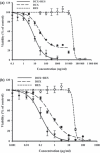
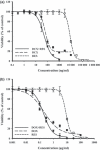
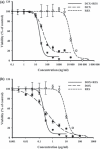
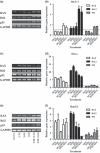

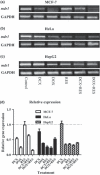
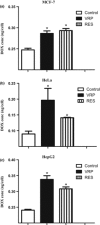
References
-
- World Health Organization (2008) The Global Burden of Disease: 2004 Update. Geneva: WHO; Available at http://www.who.int/evidence/bod (accessed 6 May 2011).
-
- Murray CJ, Lopez AD, Black R, Mathers CD, Shibuya K, Ezzati M, et al. (2007) Global burden of disease 2005: call for collaborators. Lancet 370, 109–110. - PubMed
-
- Dev S (2010) Impact of natural products in modern drug development. Indian J. Exp. Biol. 48, 191–198. - PubMed
Publication types
MeSH terms
Substances
LinkOut - more resources
Full Text Sources
Other Literature Sources
Research Materials
Miscellaneous

